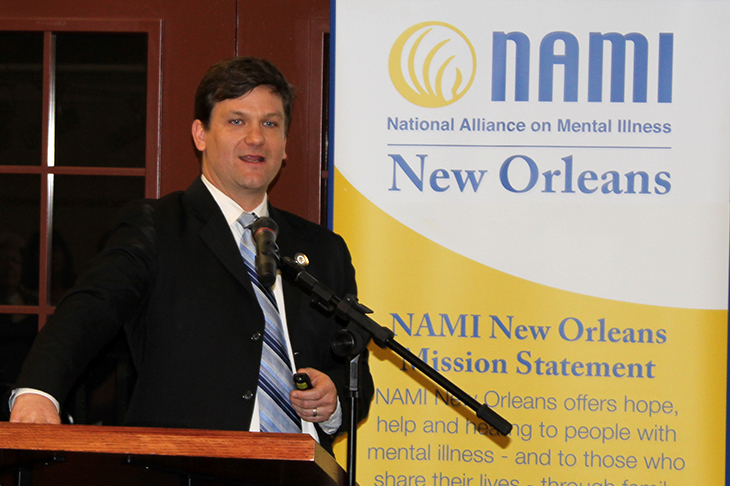Fighting for the mental health of the city

At a recent annual meeting of the New Orleans chapter of the National Alliance on Mental Illness, Dr. Jeffrey C. Rouse outlines the progress the city has made in rebuilding the mental healthcare infrastructure since Hurricane Katrina nearly 10 years ago. Before the storm, there were about 600 inpatient psychiatric beds in the area; afterward, there were about 60. (Photo by Sergio A. Alvarez)
Since Hurricane Katrina hit New Orleans nearly 10 years ago, the city has been working hard to rebuild critical infrastructure, including mental healthcare services.
“We have come so far from where we were,” Dr. Jeffrey C. Rouse, New Orleans" coroner, said at a recent annual meeting of the New Orleans chapter of the National Alliance on Mental Illness (NAMI).
Rouse is an assistant professor of forensic psychiatry at the Tulane University School of Medicine, where he trained in adult psychiatry and forensic psychiatry.
In the immediate aftermath of Hurricane Katrina, Rouse returned to his hometown of New Orleans to establish a disaster medical clinic on Canal Street, treating citizens and the first responders who were rescuing them. For these efforts, he received the 2007 Bruno Lima Award for Excellence in Disaster Psychiatry from the American Psychiatric Association and a Commendation from the New Orleans City Council.
He ran the mental health division within the coroner"s office after Katrina and he was elected the Orleans Parish coroner in 2014.
“I"ve always seen timeliness of [coroner"s] investigations as a mental health issue,” Rouse said. Advocating for the reestablishment of medical and mental health infrastructure since the storm, he has testified in front of the U.S. Senate, the Louisiana Legislature and the New Orleans City Council.
Quoting Frederick Douglass, “If there is no struggle, there is no progress,” Rouse added, “The brain of New Orleans has seen things and experienced things that nobody else knows, nobody can explain ⦠Man, have we had to struggle ⦠And we"ve made some serious progress.”
Rouse also works at Grace Outreach Center, a group home in Central City for men with mental illness and substance abuse who are reintegrating themselves into society after criminal charges. Prior to that, he led the New Orleans FACT team, making house calls on psychiatric patients to enhance stability and prevent re-hospitalization or incarceration.
“The brain of New Orleans has seen things and experienced things that nobody else knows, nobody can explain.”—Dr. Jeffrey C. Rouse, New Orleans coroner
